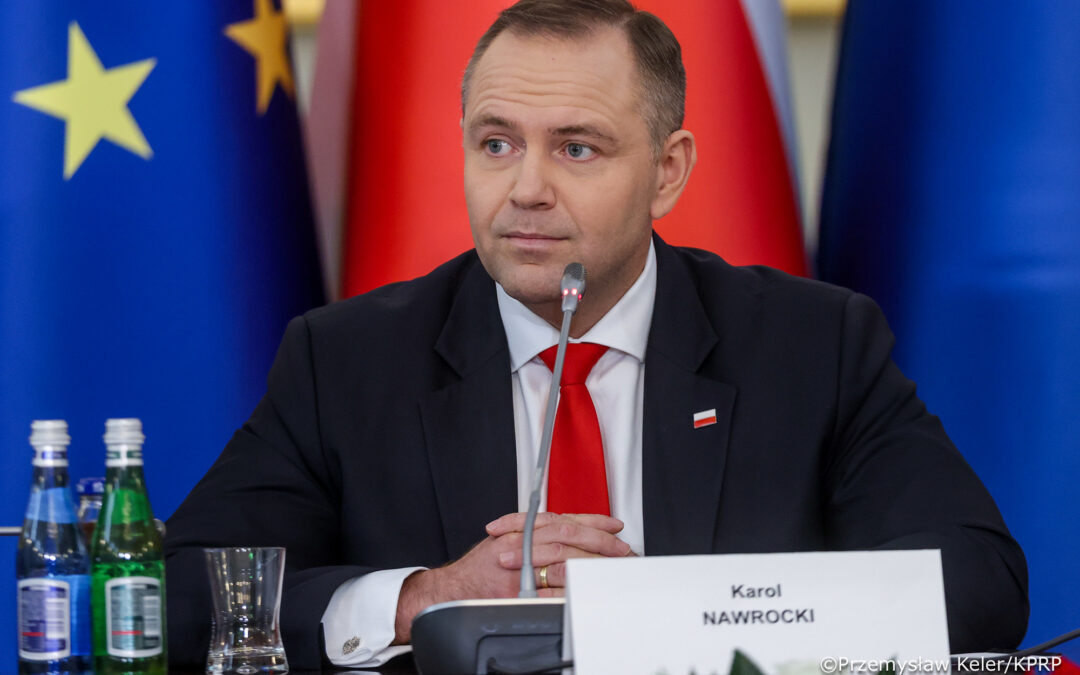Keep our news free from ads and paywalls by making a donation to support our work!

Notes from Poland is run by a small editorial team and is published by an independent, non-profit foundation that is funded through donations from our readers. We cannot do what we do without your support.
President Karol Nawrocki, who is aligned with the right-wing opposition, has vetoed plans by the government to create Poland’s first national park in 24 years. He argues that it would “block the economic development of the region” and threaten Poland’s security.
Since taking office in early August, Nawrocki has regularly vetoed bills passed by the government’s majority in parliament. On Friday evening, his office announced four further vetoes.
Among them was a bill, approved by parliament in September, to create the Lower Oder Valley National Park, which would have run along the Polish side of part of the Oder River, which marks the border with Germany.
A so-called landscape park already exists there, but the government wanted to upgrade it to a national park, which offers better levels of protection for nature. A national park already exists on the German side of the river.
In his justification for the veto, Nawrocki argued that the plans would hinder economic activity – especially the use of the Oder for transport – and also raise security concerns.
“Environmental protection must go hand in hand with the country’s economic security…[which] cannot be based on an ambiguous provision that may hinder its development,” wrote the president.
He added that, “as the supreme commander of the Polish armed forces, I emphasise that decisions regarding investments necessary to ensure and develop the defence potential of Poland cannot be dependent on a decision of the climate and environment minister based on the opinion of the director of a national park”.
Nawrocki also claimed that necessary analyses of the impact of establishing the park had not been properly carried out and that local communities had not been fully consulted.
“It is essential that the decision to establish a national park – especially in multifunctional areas – be preceded by thorough analysis of the balance of benefits and constraints, taking into account both nature conservation and the rational management of environmental resources and infrastructure,” wrote the president.
His veto was immediately condemned by the climate and environment minister, Paulina Hennig-Kloska, who said that it was “based on lies and political manoeuvring”.
“Instead of standing on the side of the state, natural heritage, and timeless values, the president stood today for partisan interests,” she wrote. The opposition Law and Justice (PiS) party, with which Nawrocki is aligned, has consistently opposed plans for the national park.
Zamiast po stronie państwa, dziedzictwa przyrodniczego, ponadczasowych wartości Pan Prezydent stanął dziś za interesem partyjnym.
Zawetowanie ustawy tworzącej Park Narodowy Doliny Dolnej Odry to zwykle, oparte na kłamstwie politykierstwo. Nie ma żadnych prawdziwych minusów tej… pic.twitter.com/TSXT9x7IUF
— Paulina Hennig-Kloska (@hennigkloska) November 7, 2025
Olgierd Geblewicz, the government-appointed governor of the province in which the park would have been established, also condemned the president’s decision. He said that claims the park would prevent the river from being used for transport are untrue.
Both he and Hennig-Kloska pledged that they would find “an alternative solution” to introduce stronger protection of nature in the area.
The proposed Lower Oder Valley National Park would have covered an area of 3,856 hectares around the villages of Kołbaskowo and Widuchowa as well as the city of Szczecin. It could later be enlarged by an additional area around the town of Gryfino, extending the park to a total of 6,051 hectares.
Local activists have been seeking to establish the park for three decades. Those efforts intensified after an ecological disaster in 2022 during which pollution of the Oder River caused toxic algal blooms that led to as many as half of the river’s fish dying out.
Parliament has approved the government's plans to create Poland's first new national park in 24 years.
However, the right-wing opposition voted against the bill, and it remains possible that opposition-aligned President @NawrockiKn will veto it https://t.co/qjxWXPRHJM
— Notes from Poland 🇵🇱 (@notesfrompoland) September 27, 2025
However, some local residents, including anglers, have expressed opposition to the plans, while PiS has warned about the impact on shipping given that a national park classification confers a higher level of protection on the area, including waterways.
In response, the local authorities took into account concerns expressed by Poland’s state water authority and the Seaports Authority of Szczecin and Świnoujście and excluded certain areas from protection, including the Klucz-Ustowo and Gartz-Marwice channels, in order to facilitate inland navigation.
Poland currently has a total of 23 national parks, covering around 1% of the country’s territory. The first to be established, in 1932, was Pieniny National Park on the mountainous border with Slovakia. The most recent to be created, in 2001, was Warta Mouth National Park, which also sits along the border with Germany.

Notes from Poland is run by a small editorial team and published by an independent, non-profit foundation that is funded through donations from our readers. We cannot do what we do without your support.
Main image credit: Przemysłąw Keler/KPRP

Daniel Tilles is editor-in-chief of Notes from Poland. He has written on Polish affairs for a wide range of publications, including Foreign Policy, POLITICO Europe, EUobserver and Dziennik Gazeta Prawna.



















